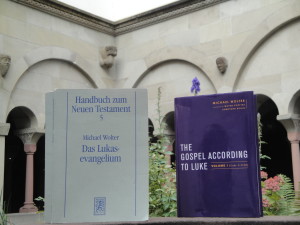I am very pleased to learn that the first part of the English translation of Michael Wolter’s commentary on the Gospel of Luke (originally published in the Handbuch zum Neuen Testament series) has just been released. This volume contains Wolter’s introduction to Luke and the commentary on the first 9 chapters of the gospel.
I had been working on this project over the last one and a half years or so, helping the main translator Wayne Coppins in his momentous task of bringing this extremely detailed work into English.
Wayne Coppins and Simon Gathercole – the editors of the BMSEC series – have already noted some good observations on Wolter’s commentary in their introduction. I want to use this opportunity to likewise point out two notable feature of Wolter’s commentary I particularly enjoyed.
My first comment relates to one of the most central motivations behind this blog – “bridging the German-English divide.” Wolter writes from a specifically German perspective, which differs from other academic traditions in many regards, including some basic hermeneutical decisions. Still, I think his commentary is exemplary in the way he integrates the work of other scholars from different spheres, particularly the work by more “conservative” English-speaking scholars (such as D. L. Bock, C. A. Evans, J.B. Green, I. H. Marshall, etc.). He neither ignores them nor does he ridicule them or enter into pointless discussions with them (which would be pointless because the real disagreement can’t be resolved on the level of exegesis). Rather, he a) notes their positions where he disagrees on exegetical matters because he simply follows a different scholarly path (thus making alternative positions visible as such – which is a heavily underestimated aspect, from my perspective) and b), where real interaction on the same level (i.e. on the basis of shared presuppositions) is possible, he enters into respectful dialogue with their arguments, sometimes benefiting from their work sometimes offering valuable criticism. In a certain way, this approach reminds me of Oda Wischmeyer’s take on N.T. Wright’s hermeneutics in GFP, which allowed her both to recognize hermeneutical differences without talking about them in an arrogant manner and to perceive of the strengths and the potential benefits of his paradigm. (Check out Wayne Coppins’s remarks on Wischmeyer’s essay, which express a similar judgement.)
The second comment I want to make is related to this aspect of interaction with other voices but focuses more on the specific contribution of a commentary writer and the proportion of unhelpful material he or she incorporates. Let me explain this a bit: Usually one does not read commentaries on biblical books cover to cover. But if you translate one you inevitably have to. Furthermore, I found translating a commentary more difficult than doing the same with other argumentative texts: in commentaries, the thoughts of the exegete are expressed in a very dense manner and he or she does not simply tell us what supports one major point but rather a multitude of things relating to a variety of textual phenomena. In translating a commentary you have to decide what precisely is being said in each and every proposition for otherwise you might accidently create new exegetical remarks. In that regard my impression was that Wolter made a big effort to make it clear what he actually wants to communicate. This is only possible, to be sure, if the author is offering his or her unique opinion, offering a truly “eigenständig” conception. Sometimes in commentaries you notice a certain vagueness that is probably due to the commentator trying to summarize the results of other persons while not having an own opinion that would help him or her navigate through these proposals. Not so in Wolter’s commentary on Luke: it is clear that he doesn’t write just for the sake of having said something on a particular textual feature. Rather, where he comments on the text this is because his prior research has made him come to the conclusion that he actually has something meaningful to say about that issue.
Thus, in conclusion – unsurprisingly perhaps but all the same wholeheartedly – I warmly recommend this publication to you. Also, stay tuned for the second volume, the publication of which is scheduled for 2017.
Christoph Heilig is working on an SNF-Project on “Narrative-Substructures in the Letters of Paul” with Prof. Jörg Frey. He is the author of Hidden Criticism? Methodology and Plausibility of the Search for a Counter-Imperial Subtext in Paul, WUNT II 392 (Tübingen: Mohr Siebeck, 2015) and Paul’s Triumph: Reassessing 2 Corinthians 2:14 in Its Literary and Historical Context, BTS 27 (Leuven: Peeters, 2016).





2 Kommentare vorhanden
1 Paul’s Triumph // Feb 2, 2017 at 9:40
[…] by no means my intention here to criticize every aspect of that trend (I recently co-translated a commentary myself!), but the recent debate surrounding plagiarism seems at least to have demonstrated, that […]
2 Translation of Important Commentary on the Gospel of Luke // Dec 21, 2017 at 17:19
[…] my comments on the commentary as a whole, see my earlier blog post. Make sure you also check out the various posts on this work by the main translator, Wayne Coppins. […]
Kommentar schreiben